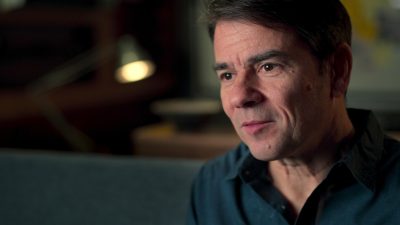Local Aviation Journalist Featured in Hit Netflix Series About Mystery Flight
News Based on facts, either observed and verified directly by the reporter, or reported and verified from knowledgeable sources.
Wednesday, Mar. 8 marked a grim milestone – the ninth anniversary of the mysterious disappearance of Malaysia Airlines Flight MH370. The plane was en route from Kuala Lumpur to Beijing on an overnight flight when it suddenly dropped off of radar and went missing with 239 individuals aboard – 227 passengers and 12 crew members.

Despite an unprecedented international search and rescue operation that lasted months, its whereabouts remain unknown to this day.
Journalist and author Jeff Wise has spent most of his career covering science and the aviation industry. The Irvington resident, who relocated to Westchester from Manhattan six years ago, investigated the doomed flight’s disappearance and wrote a book, “The Taking of MH370,” detailing his findings and conclusions about the tragedy.
Netflix featured him as the primary commentator in its new hit documentary series, “MH370: The Plane That Disappeared.” Premiering earlier this month, on the anniversary of the plane’s disappearance, the docuseries was the second most-watched program on Netflix as of press time.
We spoke with Wise about his research and investigation that culminated in both his book and the series and his takeaways on the greatest mystery in modern aviation history.
How long have you been covering aviation as a journalist, and what set you on the path to making that your ‘beat?”
I got my pilot’s license 20 years ago, and like many pilots became very interested in accident reports. When Air France 447 disappeared in 2009, I covered that quite heavily. It was the biggest aviation mystery before MH370.
Do you recall the moment you first learned of MH370’s disappearance and did you have any immediate thoughts or gut instincts on what happened?
I don’t remember the exact moment, but I do recall thinking that it was probably another tragedy that would be figured out in a day or two. I assumed it wouldn’t be very interesting, and frankly, I wasn’t really in the mood to cover another sad event.
How and why did you begin to investigate its disappearance? Was there something specific about it beyond your existing interest as an aviation journalist?
As the documentary describes, the whole tenor of the incident changed when it was revealed that the plane had reversed course and continued flying after it had disappeared from air traffic controllers’ screens. Right away, it was clear that something really weird was going on.
How and why did your research and investigations bring you to write a book about it?
Most news stories are extremely limited in scope; you’ve got a couple of hundred words, maybe several thousand if you’re really lucky, to describe to your readers what’s going on. It’s like looking at the world through a straw. What I had to say about MH370 required a lot more space than that. It’s truly a sweeping story involving a lot of science and engineering, everything from marine biology to the psychology of suicide.
What were your intentions in writing the book?
My goal was to explain to the public that MH370 possessed a rare vulnerability that left it vulnerable to a sophisticated hack. I can’t prove that this vulnerability was exploited, but the fact that it existed should be cause for concern. If it was exploited, it meant that a sophisticated and ruthless (actor) was out there trying to do us harm. Unfortunately, while I haven’t been able to prove my hypothesis, the consequences that I feared very much did come to pass. I’m speaking of Russia’s ongoing attack against Western liberal democracy, most recently manifested in the successful tampering with the 2016 election and the savage invasion of Ukraine.
What was the reaction to the book, especially from those in the aviation industry and Malaysia Airlines, and also the loved ones of the missing passengers?
Officially, there’s been no reaction at all, but I’ve heard that internally the official agencies responsible for the search are skeptical. I’m hoping that the response to the Netflix documentary will dislodge their complacency.
Is there a particular takeaway you hope viewers get from the series?
I hope viewers come away understanding that while the mystery has remained unsolved after all these years, it isn’t hopeless. In fact, it remains urgent that we solve this case, and to do that we need to go back to first principles. We need for the authorities to admit that their efforts have failed and to grapple with where they might have gone wrong. What assumptions did they make that might have been wrong?

Did it turn out the way you had hoped and accomplish those goals?
I’ve been extremely heartened by the response it’s gotten so far. This is not only a deeply perplexing mystery, it’s one that’s important. What’s at stake is not only the safety of the world’s air transport industry, but potentially the future of democracy.
What’s been the response and reaction to the series so far?
The response has been shockingly positive. It’s rating very highly, and people are not only enjoying it but they’re also talking about it with their friends, family and colleagues.
Through researching and investigating the disappearance, have you forged close relationships with any of the families or loved ones of the missing passengers?
I have had some conversations with them, but I haven’t tried to become close. They’re grieving, and I don’t want to exploit that. I feel that the best I can do for them is to shed as much light journalistically on this story as I can.
Do you think we’ll ever learn what really happened, or will this go down in history as one of the world’s greatest unsolved mysteries?
It’s a mystery that looks stranger the closer you look. When you only know a few details, it’s easy to think that the answer is obvious. But as you dig deeper, you encounter many aspects of the case that defy expectations and are harder to explain. If viewers are intrigued by the documentary and want to know more, I’d urge them to read my book, which provides an overview of the important features of the case.
We can solve it, and we will solve it if we apply the necessary resources and mindset.

Robert Schork is Examiner Media’s Digital Editorial Director.
